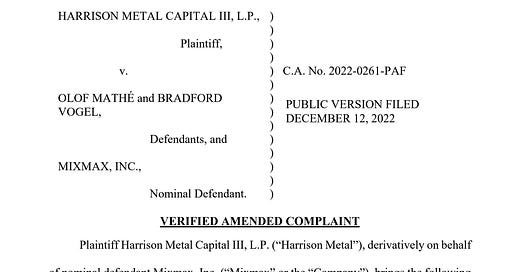Investor Harrison Metal Sues Startup Founders It Backed
A lawsuit alleges "deceptive conduct," "self-dealing," and making false representations in a PPP loan forgiveness application
Two weeks ago I asked if 2023 would be the year of founder accountability. I wrote, “The cult of the founder created some enormous tech companies, but it’s also gotten out of hand.”
So I was interested to see that the early-stage investor Harrison Metal has sued one of its own portfolio companies. Harrison Metal founder and Mixmax board member Michael Dearing seems to be spearheading the lawsuit.
Harrison Metal alleges that two Mixmax co-founders — Olof Mathé and Bradford Vogel — successfully applied for forgiveness for their Paycheck Protection Program loan. Then, instead of using the money to retain employees as the company certified it would, they used it to enrich themselves, according to the lawsuit.
Mixmax is a sales engagement platform that, according to PitchBook, has raised about $13 million since its founding in 2014.
Harrison Metal invested in the seed round in 2015, according to a TechCrunch story, along with Floodgate’s Mike Maples Jr. and Ann Miura-Ko, Ram Shriram of Sherpalo Ventures and angels Eric Ries, Soundcloud CEO Alex Ljung, Nuzzel founder Jonathan Abrams, then-Inkling CEO Matt MacInnis and former Soundcloud CEO Eric Quidenus-Wahlforss.
But the relationship between Dearing and the company’s founders became acrimonious with the founders hiding an effort to raise money from Harrison Metal, according to the suit. Dearing hired consulting firm Alvarez & Marsal to investigate the company at his own expense, according the lawsuit.
Harrison Metal’s lawsuit, the public version of which is dated Dec. 12, 2022, alleges:
Mathé made materially false statements to several of the Company’s major investors, including Harrison Metal, to induce them into believing that Mixmax needed the PPP Loan, and that those investors should waive by amendment key contractual protections afforded by an Investors’ Rights Agreement (“IRA”) to help the Company secure it. Even the amended terms of the IRA did not allow Mathé to increase his own compensation without investor approval. That did not stop him. During the period that he sought board and stockholder approval for the PPP loan application and forgiveness, Mathé never disclosed to any stockholders or board members (other than Vogel and [Creandum general partner Carl] Fritjofsson) his intention to lay off employees and replace them with offshore labor or the secret compensation raises he would soon grant himself. Mathé’s PPP Loan scheme furthered his goal of entrenching and enriching himself at the expense of Mixmax and its stockholders.
Mathé, Vogel, Fritjofsson, and Dearing did not return email requests for comment.




